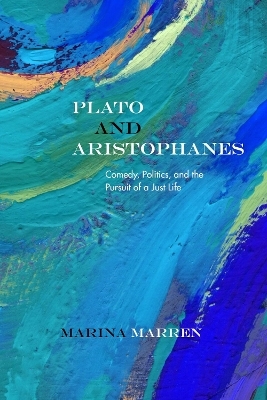
Plato and Aristophanes
Comedy, Politics, and the Pursuit of a Just Life
Seiten
2023
Northwestern University Press (Verlag)
978-0-8101-4419-4 (ISBN)
Northwestern University Press (Verlag)
978-0-8101-4419-4 (ISBN)
- Titel z.Zt. nicht lieferbar
- Versandkostenfrei innerhalb Deutschlands
- Auch auf Rechnung
- Verfügbarkeit in der Filiale vor Ort prüfen
- Artikel merken
Contends that our search for communal justice must start with self-examination. The realization that there are things that we cannot know about ourselves unless we become the subject of a joke is integral to such self-scrutiny. Jokes provide a new perspective on our politics and ethics; they are essential to our civic self-awareness.
In Plato and Aristophanes, Marina Marren contends that our search for communal justice must start with self-examination. The realization that there are things that we cannot know about ourselves unless we become the subject of a joke is integral to such self-scrutiny. Jokes provide a new perspective on our politics and ethics; they are essential to our civic self-awareness.
Marren makes this case by delving into Plato’s Republic, a foundational work of political philosophy. While the Republic straightforwardly condemns the decadence and greed of a tyrant, Plato’s attack on political idealism is both solemn and comedic. In fact, Plato draws on the same comedic stock and tropes as Aristophanes’s plays. Marren’s book strikes up an innovative conversation between three works by Aristophanes—Assembly Women, Knights, and Birds—and Plato’s philosophy, prompting important questions about individual convictions and one’s personal search for justice. These dialogic works offer critiques of tyranny that are by turns brilliant, scathing, and exuberant, making light of faults and ideals alike. Philosophical comedy exposes despotism in individuals as well as systems of government claiming to be just and good. This critique holds as much bite against contemporary injustices as it did at the time of Aristophanes and Plato.
An ingenious new work by an emerging scholar, Plato and Aristophanes shows that comedy—in tandem with philosophy and politics—is essential to self-examination. And without such examination, there is no hope for a just life.
In Plato and Aristophanes, Marina Marren contends that our search for communal justice must start with self-examination. The realization that there are things that we cannot know about ourselves unless we become the subject of a joke is integral to such self-scrutiny. Jokes provide a new perspective on our politics and ethics; they are essential to our civic self-awareness.
Marren makes this case by delving into Plato’s Republic, a foundational work of political philosophy. While the Republic straightforwardly condemns the decadence and greed of a tyrant, Plato’s attack on political idealism is both solemn and comedic. In fact, Plato draws on the same comedic stock and tropes as Aristophanes’s plays. Marren’s book strikes up an innovative conversation between three works by Aristophanes—Assembly Women, Knights, and Birds—and Plato’s philosophy, prompting important questions about individual convictions and one’s personal search for justice. These dialogic works offer critiques of tyranny that are by turns brilliant, scathing, and exuberant, making light of faults and ideals alike. Philosophical comedy exposes despotism in individuals as well as systems of government claiming to be just and good. This critique holds as much bite against contemporary injustices as it did at the time of Aristophanes and Plato.
An ingenious new work by an emerging scholar, Plato and Aristophanes shows that comedy—in tandem with philosophy and politics—is essential to self-examination. And without such examination, there is no hope for a just life.
MARINA MARREN is a postdoctoral teaching fellow in the Department of Philosophy at the University of Nevada, Reno.
Acknowledgments
Introduction: Philosophical Comedy as an Aesthetic Critique of Political Ideals
1. Plato’s and Aristophanes's Comedy
2. Communist Terror: Republic V and VIII and The Assembly Women
3. The Rule of Satiated Mediocrity: Republic VI and The Knights
4. Failures of High‑Minded Politics: Republic VI and The Birds
5. No Laughing Matter: Tyranny in Republic VIII and IX
Conclusion: Self-examination and Communal Justice
Notes
Bibliography
Index
| Erscheinungsdatum | 01.12.2021 |
|---|---|
| Reihe/Serie | Rereading Ancient Philosophy |
| Verlagsort | Evanston |
| Sprache | englisch |
| Maße | 152 x 229 mm |
| Gewicht | 363 g |
| Themenwelt | Geisteswissenschaften ► Philosophie ► Philosophie Altertum / Antike |
| ISBN-10 | 0-8101-4419-0 / 0810144190 |
| ISBN-13 | 978-0-8101-4419-4 / 9780810144194 |
| Zustand | Neuware |
| Haben Sie eine Frage zum Produkt? |
Mehr entdecken
aus dem Bereich
aus dem Bereich
mit Sokrates, Seneca, Platon & Co. im Gespräch
Buch | Hardcover (2023)
FinanzBuch Verlag
18,00 €


